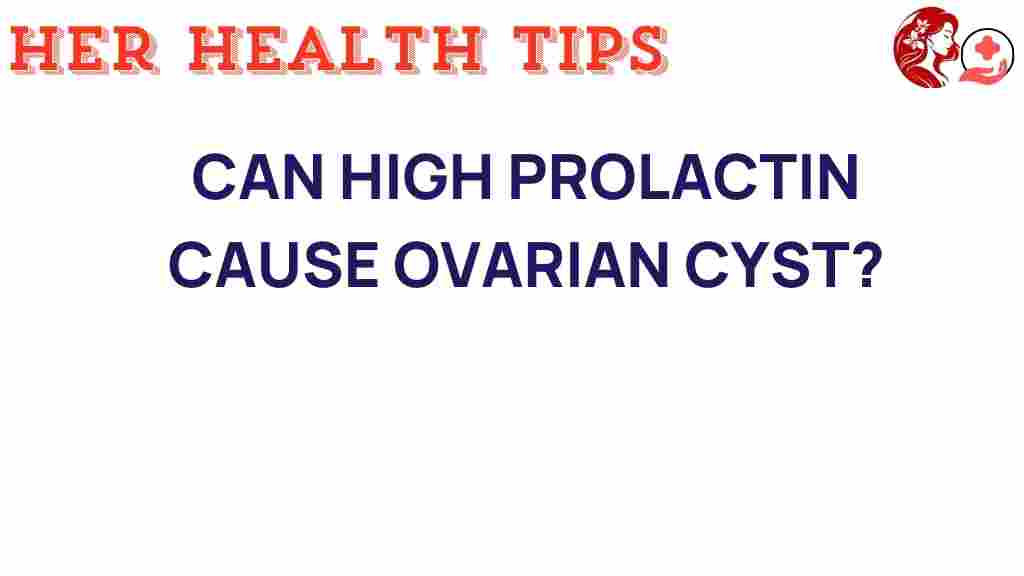The Surprising Link Between High Prolactin Levels and Ovarian Cysts
When it comes to women’s health, understanding the intricate connections between different hormonal levels and reproductive health is crucial. One area that has gained attention in recent medical research is the relationship between high prolactin levels and ovarian cysts. This relationship highlights the importance of a balanced endocrine system and its impact on overall fertility issues.
Understanding Prolactin and Its Role in Women’s Health
Prolactin is a hormone produced by the pituitary gland, primarily known for its role in lactation. However, it also plays a significant role in regulating the menstrual cycle and influencing reproductive health.
- High Prolactin Levels: Known as hyperprolactinemia, high prolactin levels can lead to various symptoms, including irregular periods, infertility, and even the development of ovarian cysts.
- Normal Prolactin Levels: In women, normal prolactin levels are typically below 25 ng/mL. Levels above this threshold may indicate hormonal imbalance.
The Connection Between High Prolactin and Ovarian Cysts
Research has shown that elevated prolactin levels can disrupt the balance of other hormones, which can lead to the formation of ovarian cysts. Ovarian cysts are fluid-filled sacs that develop on the ovaries and can vary in size. While many women may have cysts without symptoms, some can cause pain and complications.
- Hormonal Imbalance: High prolactin can lead to an imbalance in estrogen and progesterone levels, which are critical for regular ovulation.
- Follicular Cysts: In some cases, high prolactin can prevent the release of eggs, causing follicles to become cysts instead of maturing and ovulating.
Medical Research Supporting the Link
Several studies have explored the connection between high prolactin levels and ovarian cysts. For instance, a study published in the Journal of Endocrinology and Metabolism found that women with hyperprolactinemia had a higher incidence of ovarian cysts compared to those with normal prolactin levels. This underscores the importance of monitoring prolactin levels in women experiencing fertility issues.
Step-by-Step Process: Diagnosing High Prolactin and Ovarian Cysts
If you suspect that you have high prolactin levels or ovarian cysts, it’s essential to take the following steps:
Step 1: Consult a Healthcare Professional
Schedule an appointment with your doctor or a specialist in women’s health. They will review your medical history and symptoms.
Step 2: Blood Tests
Your healthcare provider will likely order blood tests to measure your prolactin levels, as well as other hormones involved in the menstrual cycle.
Step 3: Imaging Tests
If high prolactin levels are detected, your doctor may recommend imaging tests, such as an ultrasound, to check for ovarian cysts and assess their size and nature.
Step 4: Treatment Options
Depending on the results, treatment may involve:
- Medications: Dopamine agonists are often prescribed to lower prolactin levels.
- Monitoring: In some cases, especially with small cysts, monitoring may be all that’s necessary.
- Surgery: In rare cases, if cysts are large or cause significant symptoms, surgical intervention may be required.
Step 5: Regular Follow-up
After initiating treatment, regular follow-up appointments will help monitor your hormone levels and the status of any ovarian cysts.
Troubleshooting Tips for Managing High Prolactin and Ovarian Cysts
Managing high prolactin levels and ovarian cysts may require lifestyle modifications in addition to medical treatment. Here are some tips:
- Maintain a Healthy Diet: A balanced diet rich in fruits, vegetables, whole grains, and lean proteins can support hormonal health.
- Regular Exercise: Engaging in regular physical activity can help regulate hormone levels and improve overall health.
- Stress Management: High stress can impact hormone levels. Techniques such as yoga, meditation, or deep breathing exercises can be beneficial.
- Avoid Endocrine Disruptors: Limit exposure to chemicals that can affect hormonal balance, such as certain plastics and pesticides.
Conclusion: The Importance of Monitoring Hormonal Health
Understanding the link between high prolactin levels and ovarian cysts is vital for addressing fertility issues and maintaining reproductive health. Women experiencing symptoms such as irregular periods or unexplained infertility should consider getting their hormone levels checked.
Medical research continues to shed light on these important connections, emphasizing the need for awareness and proactive management of hormonal imbalances. By staying informed and working closely with healthcare providers, women can take charge of their women’s health and navigate the complexities of their endocrine system.
For more information on women’s health and hormonal balance, consider visiting reputable sources or speaking to a healthcare professional about your concerns.
This article is in the category Reproductive and created by HerHealthTips Team
